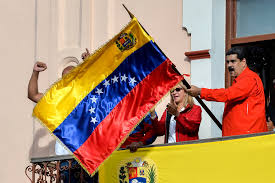Venezuela: What Next after the Disputed Elections?
Venezuela held presidential elections on July 28. Incumbent Nicolás Maduro faced opposition candidate Edmundo González. González led in pre-election polls, largely due to the endorsement from banned opposition leader María Corina Machado.
Anonymous
8/9/20242 min read


Under intense international scrutiny, Venezuela held presidential elections on July 28. Incumbent Nicolás Maduro, who has been in power since 2013 after being designated by the late President Hugo Chávez, faced opposition candidate Edmundo González. González led in pre-election polls, largely due to the endorsement from banned opposition leader María Corina Machado.
Six hours after polls closed, the National Electoral Council (CNE) declared Maduro the winner, but did not provide detailed results or evidence. This led opposition supporters to protest, facing violent responses from state security forces. The situation has left a weakened government, a frustrated opposition, and foreign governments unsure of their next moves.
Background
The controversy of the 2024 presidential election is rooted in the disputed 2018 vote. Maduro’s victory then was deemed illegitimate by the U.S., the EU, and many neighboring countries, leading them to recognize opposition leader Juan Guaidó as interim president. Economic sanctions were imposed by Washington, but Maduro retained power with military backing and support from Russia, Iran, and Cuba. Sporadic talks between the government and opposition, facilitated by Norway, led to the Barbados Agreement of October 2023. The agreement promised better conditions for the 2024 election in exchange for conditional sanctions relief.
Despite this, the government banned Machado from running and blocked her substitute’s candidacy. González, a 74-year-old retired diplomat, became the opposition’s third choice and garnered significant support. Ten candidates appeared on the official ballot, many considered government plants. However, the campaign became a two-horse race, with reputable polls showing González with a substantial lead over Maduro.
Election Day
Election day was mostly peaceful, but post-polling irregularities were reported. Opposition witnesses claimed that authorities were denying them access to vote tallies. Despite a declaration from CNE president Elvis Amoroso that Maduro won with 51.2% of the vote, the opposition claimed victory, posting their tallies online. The government blocked access to these results, and international observers, like the Carter Center, stated the election did not meet international standards.
Post-Election Unrest
The government’s announcement led to unrest, with spontaneous demonstrations met by violent responses from security forces. Twenty deaths and over 1,000 arrests were reported. Opposition leaders called for restraint and brief rallies, while the military reaffirmed its support for Maduro. Leading opposition figures faced arrests, signaling a potential crackdown.
International Response
Countries have called for full transparency of the election results. Six Latin American countries refused to recognize Maduro’s victory without detailed figures, leading to diplomatic expulsions. The U.S. declared González the winner, while Maduro’s allies accused the opposition of hacking the system.
Key countries, including Brazil, Colombia, and Mexico, have urged for transparency while avoiding outright declarations of fraud. Diplomatic efforts are ongoing, but Maduro is unlikely to concede if transparency threatens his power. The Supreme Court, loyal to Maduro, is expected to endorse the election results.
Future Prospects
Maduro appears to be entrenching his position, despite likely emerging weakened domestically and internationally. The opposition, more united than in years, faces dilemmas about participating in upcoming parliamentary and local elections or boycotting them. The path forward may require continued negotiations and international pressure.
Countries and multilateral bodies should press for an independent review of the election results and continue diplomatic efforts. Avoiding additional sanctions and focusing on negotiations may offer a way out of Venezuela’s political and economic crisis. However, prospects for meaningful talks remain uncertain, with the opposition exploring options, including a face-saving deal for Maduro to step down. As the crisis deepens, all options for resolving the deadlock should be considered.
Humanitarian Crisis
© 2024 | All Rights Reserved by the Bolivar Organization | bolivar.org
Venezuela crisis
Economic collapse
Hyperinflation
Food shortages
Medicine shortages
Mass emigration
Political instability
Corruption
Nicolás Maduro
Opposition efforts
Sanctions
Humanitarian crisis
Refugee Crisis
Oil revenue decline
Mismanagement of resources
Decline in living standards
International criticism
Venezuelan migration
Malnutrition
Healthcare system collapse
Electoral fraud
Human rights violations
International aid
United Nations
Juan Guaidó
Military control
Regional impact
Diplomatic efforts
Transparency International
Economic sanctions
